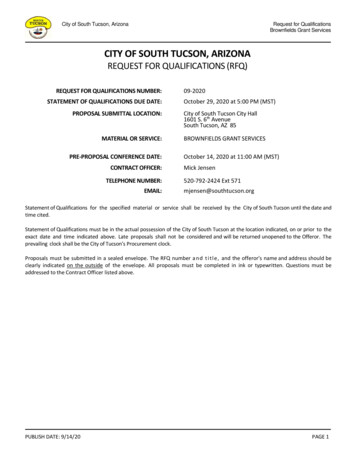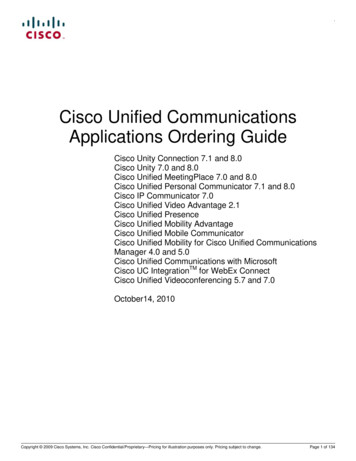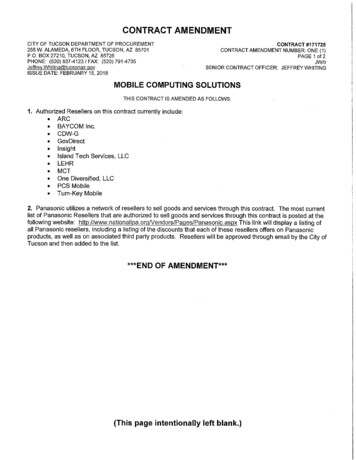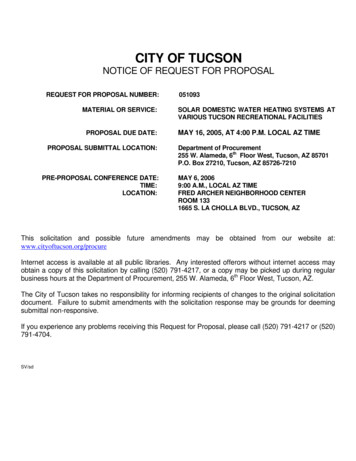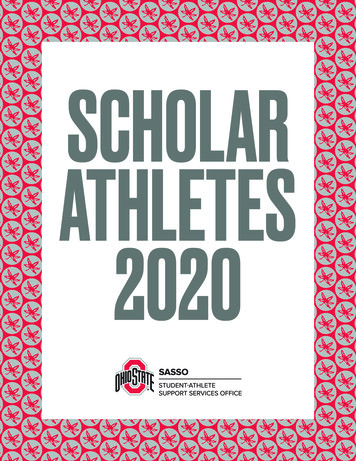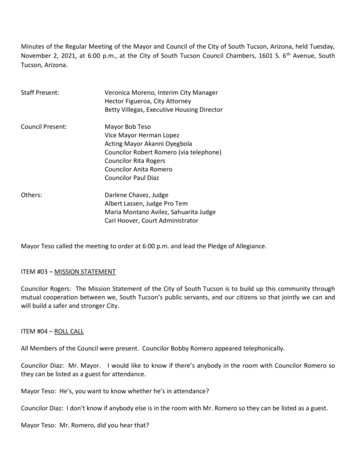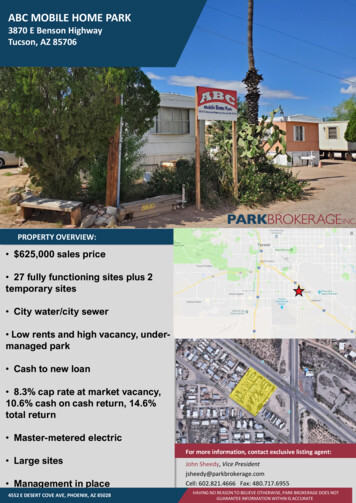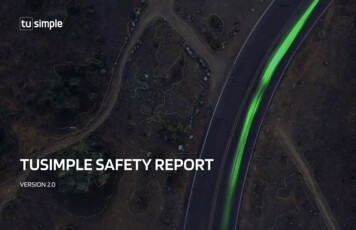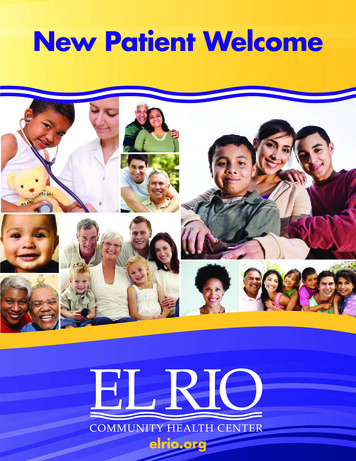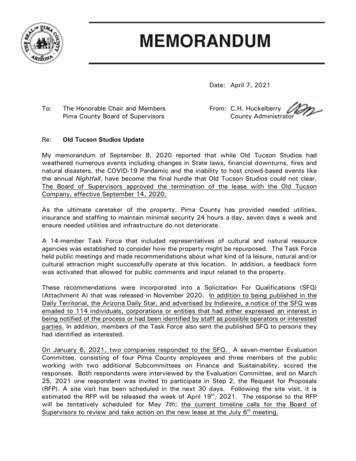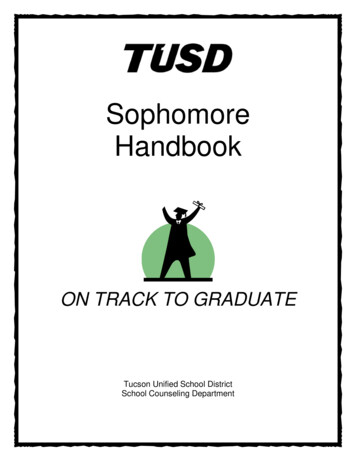
Transcription
SophomoreHandbookON TRACK TO GRADUATETucson Unified School DistrictSchool Counseling Department
TUSD Governing BoardPresidentAdelita S. GrijalvaClerkKristel Ann FosterMembersMichael HicksCam JuárezDr. Mark StegemanSuperintendentH.T. Sánchez, Ed.D.School Counseling DepartmentHolly Colonna, DirectorNotice of NondiscriminationTucson Unified School District is committed to a policy of nondiscrimination based on disability, race, color,religion/religious beliefs, sex, sexual orientation, gender identity or expression, age, or national origin. This policy willprevail in all matters concerning Governing Board, District employees, students, the public, educational programs andservices, and individuals with whom the Board does business.Inquiries concerning Title VI, Title VII, Title IX, Section 504, and Americans With Disabilities Act may be referred to EEOCompliance Officer, 1010 East 10th Street, Tucson, Arizona 85719, (520) 225-6444, or to the Office for Civil Rights,U.S. Department of Education, Cesar E. Chavez Memorial Building, 1244 Speer Boulevard, Suite 310, Denver, Colorado80204-3582.Aviso De No DiscriminaciónEl Distrito Escolar unificado de Tucson está comprometido a una política no discriminatoria basada en discapacidad,raza, color, religión, sexo, orientación sexual, identidad o expresión de género, edad u origen nacional. Esta políticaprevalecerá en todos los asuntos relativos a la Mesa Directiva, los empleados del Distrito, estudiantes, el público, losservicios y programas educativos y las personas con las que la Mesa Directiva realiza negocios.Las preguntas concernientes al Título VI, Título VII, Título IX, Sección 504, y el Acta Para Americanos ConDiscapacidades, pueden ser dirigidas a: EEO Compliance Officer, 1010 East 10th Street, Tucson, Arizona 85719, (520)225-6444, o a: Office for Civil Rights, U.S. Department of Education, Cesar E. Chavez Memorial Building, 1244 SpeerBoulevard, Suite 310, Denver, Colorado 80204-3582.Sophomore Handbook 2015-16TUSD School Counseling Departmenti
TUSD School Counseling Dept.(520) 225-6211TUSD Counseling CentersCatalina High School 232-8400 (http://edweb.tusd1.org/Catalina/ )Counseling Office 232-8414; SAT/ACT H.S. Code: 030475Cholla Magnet High School 225-4000 (http://edweb.tusd1.org/Cholla/ )Counseling Office 225-4118; SAT/ACT H.S. Code: 030478Palo Verde Magnet High School 584-7400 (http://edweb.tusd1.org/paloverde/ )Counseling Office 584-7418; SAT/ACT H.S. Code: 030493Project MORE High School 225-2600 (http://edweb.tusd1.org/MORE/ )SAT/ACT H.S. Code: 030491Pueblo Magnet High School 225-4300 (http://edweb.tusd1.org/pueblo/ )Counseling Office 225-4303; SAT/ACT H.S. Code: 030500Rincon High School 232-5600 (http://edweb.tusd1.org/Rincon/ )Counseling Office 232-5600; SAT/ACT H.S. Code: 030502Sabino High School 584-7700 (http://edweb.tusd1.org/Sabino/ )Counseling Office 584-7743; SAT/ACT H.S. Code: 030503Sahuaro High School 731-7100 (http://edweb.tusd1.org/Sahuaro/ )Counseling Office 731-7210; SAT/ACT H.S. Code: 030504Santa Rita High School 731-7500 (http://edweb.tusd1.org/Santa Rita/ )Counseling Office 731-7511; SAT/ACT H.S. Code: 030513Teenage Parent High School (TAP) ( http://edweb.tusd1.org/TAPP/)Counseling Office 225-3250; SAT/ACT H.S, Code: 030594Tucson Magnet High School 225-5000 (http://edweb.tusd1.org/thms/ )Counseling Office 225-5125; SAT/ACT H.S. Code: 030530University High School 232-5900 (http://edweb.tusd1.org/uhs/ )Counseling Office 232-5903; SAT/ACT H.S. Code: 030488Sophomore Handbook 2015-16TUSD School Counseling Departmentii
Table of ContentsGeneral InformationWelcome Letter/Getting StartedI.1After High School Options1915 Top Careers20Decision Making Skills21Section One – Academic Success3Finding the Job23Sophomore Timeline4Job Application Information24Learning Styles6Job/College Interview Skills24Improve Learning Skills7Test Mania8Improve Test Taking Skills9Self Awareness28Study Tips10Effective Communication29What to do in High School11Stress Management30TUSD High School Graduation13Diversity31How to get Along With Others32Appendix 1 (Web Sites)33Appendix 2 (Schools)35Appendix 3 (4-Year Plan)36RequirementsHow to Calculate My G.P.A.II. Section Two - Career Choices1516Arizona Career Information System17The Question: What’s Next?18Sophomore Handbook 2015-16TUSD School Counseling DepartmentDefinitionIII. Section Three – Personal/Socialiii27
GETTING STARTEDGET involved in various academic, community, and social activities. Each of theseactivities will provide a wealth of experiences and help clarify your interests, goals, andplans for the future. Active involvement in high school is one key to a successful andrewarding high school experience. Get involved, take charge, and become the best student you can be. As you andyour parents plan your program, your school counselor is available to help youevery step of the way. This handbook is designed to provide you with information about timemanagement and study skills improvement, decision-making, career information,college planning, and college admission tests. Getting started with an assignment or work can sometimes be a problem.However, if you put into practice ideas from this booklet, you may find that yourhigh school years will be more rewarding! Please ask your counselor for additional materials or clarification aboutinformation in this handbook.Academic ExcellenceBuilding CharacterCitizenshipMaturityIntegrityWelcome Back Sophomores!Here are a few of our ACADEMIC EXPECTATIONS! Go to class every day. Each day you miss will cost you points toward yourgrade. A student who has 1 or 2 absences and turns in their work can earn a goodgrade. Catch up if necessary- contact your teacher about make up work. See yourteacher before or after school and ALSO DURING conference times. Be prepared by taking the proper materials with you to class. Don’t get mad at people. It’s not worth it. Don’t fight or talk about other people. You need to rely on YOURSELF. Take your future into your hands- it starts withyou. Use A Planner! Get a planner because this will help you keep track ofwhat you need to accomplish with due dates. This will also relieve stress, keepyou up to date, and give you time to plan your large projects. Take all your hard classes in your first 2 years to prepare for the future. Take your classes seriously. DON’T MESS UP! Be prepared – this includescompleting homework and taking materials to class. Be prepared for harder classes, as you get older. The same will happen incollege.Also, Challenge your limits; do not limit your challenges. Everything you do in high school is important because when you’re a senior youdo not want to scramble for classes and go back and make up failed classes. Ditching is an addiction; once you start, it’s HARD TO STOP! Take responsibility for your own ACTIONS!Sophomore Handbook 2015-16TUSD School Counseling Department1
Make the most of your high school experience it only happens once.Don’t be stubborn; listen to others when they try to help.Be RESPECTFUL OF OTHERS!It is important to get involved in extracurricular activities as soon as possible. It’sa great way to meet people. All activities will help you with scholarships andcollege or military acceptance.Do not let others DISTRACT YOU! Stay on Task!Even though you have more freedom, be responsible with it.Be prepared and be involved.And most of all enjoy your high school career.Sophomore Handbook 2015-16TUSD School Counseling Department2
SECTION ONEACADEMIC DEVELOPMENTThis section will focus on the standards that will help you be successful in high school – gettinggood grades and graduating on time. You will also learn about your options for continuing youreducation once you graduate.Here are the standards we will teach to help you:Standard A: Students will acquire the attitudes, knowledge and skills that contribute toeffective learning in school across the life span.Standard B: Students will complete school with the academic preparation essential to choosefrom a wide range of substantial post-secondary options, including college.Standard C: Students will understand the relationship of academics to the world of work and tolife at home and in the community.Now to help you learn these standards we will make sure that you cando all of these competencies or abilities:10.1.1 *Updates 4-year plan and recalculate GPA10.1.2Identifies learning style to increase academic achievement10.1.3Identifies post-secondary options consistent with interests, achievement, aptitude andabilities.10.1.4Recognizes importance of pre-college and state standards test.Preparation essential for graduation and post-secondary options.10.1.5Continues to develop effective study skills, time management and organizational skills toincrease academic achievement.* Indicates competencies that are on-going 9-12Adapted from the ASCA National Model StandardsSophomore Handbook 2015-16TUSD School Counseling Department3
SOPHOMORE TIMELINESeptember – OctoberCheck your high school classes to ensure you are taking courses to meet graduationrequirements and post graduation plans. Contact your counselor if you have any concerns.Develop a serious attitude toward your studies. Your grade point average (GPA) and classrank are important considerations for college acceptance.Develop good study habits! If you are struggling at any time – first, consult your teacher;second, seek tutoring assistance; and third, consult the academic counselor.Set personal goals for academic achievement. Evaluate and re-assess frequently to makesure you are working toward your goals.The PSAT is administered in October. Please check which date your school will beadministering the PSAT.Encourage your parents to attend OPEN HOUSE & Parent/Teacher Conferences so theycan become familiar with your schedule, your teachers, the administrators and yourcounselor.November – DecemberVisit the Career Center. Become familiar with the reference materials and the Internet inthe career center for career and post secondary exploration and information.Plan ahead for project deadlines and semester exams. Visit people employed in yourcareer interest area. Ask Questions about job tasks, helpful skills, advantages anddisadvantages; also ask about employment opportunities.Plan your extracurricular class and community activities carefully. They will be needed onyour resume for college or for work.Begin to compile information to develop a resume. Activities, GPA, Class rank, specialprograms, internships and school awards or scholarships should be included.Read and or listen to the daily announcements. The announcements will provideinformation on opportunities, activities, and important information.January – MarchBegin thinking about your Course Selection Process for next year – Pre Registration.Review your 4-year Plan. Pay attention to your classes required for graduation and collegerequirements.Review your career and educational goals.Sophomore Handbook 2015-16TUSD School Counseling Department4
Review your academic skills with your teachers. (Strengths and Weaknesses)Request recommendations in areas you need to improve or have a deficiency.Discuss your career or educational goals with your parents and counselor.Use the Career Center to review Post Secondary materials.Make a list of schools, jobs, & colleges to which you may want to consider applying.Check the entrance requirements to schools listed above.Make sure you select appropriate course work for next year and for colleges inconsideration.April – MayTake an interest inventory and analyze the results against possible career choices.Learn to use the AzCIS for occupational and post secondary information. Do your careerchoices fit your abilities and interests?Plan ahead for major project deadlines and semester exams.Set aside time for reading EVERYDAY during the summer. This will help prepare you forhigher education or college. Request suggestions from your teachers for reading that willalso benefit you in course work for the upcoming year.Use your time wisely. This is a good time to find a job, volunteer or explore your careerinterests and go to Summer School.Sophomore Handbook 2015-16TUSD School Counseling Department5
LEARNING STYLESWe all have this INCREDIBLE ability to absorb and understand information! Do YOU know howyou react to People, Events and Certain Situations? Well, understanding those characteristicscan be a key to understanding how you learn, OR YOUR Learning style.1. Do you love to socialize?2. Do you like to be the leader and be in charge?3. Do you love things to be organized?4. Do you enjoy helping others?There are no right or wrong answers to these questions. They will allow you to discover HOWYOU LEARN.REFLECTIVE OR ACTIVE LEARNERACTIVE LEARNERS – understand information after they have done something where they canapply it in the real world. Study in a group. Think of everyday ways to use the material. Think of how the material relates to you.REFLECTIVE LEARNERS – understand and retain information once they have had some timeto think (or reflect) about it. Read a bit and then stop occasionally to think about what you have read. DON’T just memorize material. Think about why the material is important. Write a summary of the information and take good notes to help you reflect later.VISUAL OR VERBALVISUAL LEARNERS – remember what they see like pictures, films, demonstrations anddiagrams. Add diagrams to your notes. Organize your ideas by main points and headings. Find connecting facts that relate to your diagrams or drawings.VERBAL LEARNERS – remember details and ideas that they hear. Discuss more of the material with others. Rest is important because you hear and listen better when you are alert. Talk about what you have heard to make sure you understand the material.SEQUENTIAL OR GLOBALSEQUENTIAL LEARNERS – feel it is easier to learn if material is presented in a logical order ofprogression. Speak to your teacher if you feel you cannot follow them from topic to topic. Re-write your note if a teacher teaches in a non-logical progression for yourunderstanding.GLOBAL LEARNERS – are those students who feel they sometimes need help “getting it.”They learn in pieces. They often struggle with organizing information but once they understand,they see the big picture. Take time with yourself and information. Go slowly until you “Get It.” Read all subtitles in a chapter to help you understand where you are going and what youneed to get. Spend more time on your subjects. Take breaks and go back. Relate the material toother things in life and discuss it with others.Sophomore Handbook 2015-16TUSD School Counseling Department6
EIGHT EASY WAYS TO IMPROVE LEARNING SKILLS Use Behavior Modification on yourself: Try to study the same subject at thesame time in the same place each day. Don’t spend more than 50 minutes at a time on one subject: Studies showthat as much is learned in four one-hour sessions than one six-hour marathonsession. If you are memorizing, don’t study for than 20 to 30 minutes. Keep alert while you are studying: The amount of attention you give a subjectis as important as the amount of time you spend. Minimize distractions. Takebreaks. Don’t let your mind wander. Study similar subjects at different times: The brain get interference fromstudying similar subjects at the same time. Avoid studying during your sleepy times: We all have a certain time of theday that we get sleepy. Avoid studying during this time. Use it to sort notes orprepare for studying. Study at the most productive time for each type of course: If it is a lecturecourse, do your studying soon after class; if it’s a course in which students arecalled on to recite or answer questions, study before class. Memorize actively, Not passively: Do not read something over and over again.Try to visualize what you are memorizing. Use association; relate the fact to belearned to something personally significant. Take more time for your Reading: Read with a purpose. Consider the PQR3technique. Preview what you are going to read, Question what you are about tolearn, and Read, Recite, and Review the material.Sophomore Handbook 2015-16TUSD School Counseling Department7
TEST MANIAPSAT– Preliminary SAT College entrance exam provided by the Collegeboard.Taken in October by 10th and 11th graders.SAT– 4-year college entrance exam Register online at www.collegeboard.com as early aspossible in the 11th grade. Re-take during the fall of 12th grade year if needed. Fee required.ACT– 4-year college entrance exam Register online at www.act.org as early as possible in the11th grade. Fee required.CPT– Computerized Placement Test used bycommunity colleges for Math and Englishplacement purposes.ASVAB– Armed Services Vocational Aptitude Battery Administered in November for 11th graders. This test helps to identify areas of skills and interests. It is a good predictor of job satisfaction.Sophomore Handbook 2015-16TUSD School Counseling Department8
IMPROVE YOUR TEST-TAKING SKILLSReview all along, rather than just before the test. Cramming doesn’t work. Test yourself, usingyour notes and book to guide you. Ask yourself questions that involve main ideas and details,others that connect the facts you’ve learned and some that require you to apply what you’velearned to a new situation. Concentrate on points your teacher said will be on the test.Memorize formulas, lists, names, or dates for which you are responsible. Budget your time oneach part of the test based on the difficulty of each part.Day of Exam: Get a good night’s sleep. Eat breakfast. Don’t indulge in last minute cramming. Stop all studying at least ½ hour before exam time. Be on time for exam. Bring all necessary tools— pens, pencils, extra paper, dictionary, notes, etc. Prepare materials to begin taking exam. DO NOT go over last minute notes. DO NOT discuss test with classmates; it’s a good way to panic yourself. Relax.Upon Receiving the Exam: Read all instructions carefully before beginning to answer. Listen carefully to any oral directions. Ask questions if you do not understand any of the instructions. Quickly skim the entire test, noting what you must do to complete it.o How many questions must be answered?o Are there any options? (i.e., 2 of the following 5; answer 10 of the following 15)o Are some questions worth more points than others? Quickly make an exam time budget. Have a watch or clock available. Begin answering questions. Work rapidly, but at a comfortable pace. Answer easy questions first. Skip any questions you don’t know the answers to or are unsure of. Don’t waste timetrying to puzzle out the answer. Read each question carefully, noting qualifiers, spoilers, cue words, or clue answers. Once you’ve gone through the test, begin to reread those questions left unanswered thefirst time through. You may have remembered the answer or the answer may have beengiven in a later test question. If there are still unanswered questions, try some educated guessing. If, after all is said and done, you still have some questions blank, GUESS— unlessthere’s a penalty for guessing (right minus wrong, which is a correction for chance). Throughout the test, take short breaks of a few seconds each. This reduces fatigue andkeeps concentration high. Before turning in the exam, check for errors. Correct any you find.Sophomore Handbook 2015-16TUSD School Counseling Department9
STUDY TIPSGives you Confidence!Set The Right Atmosphere: Study where you can concentrate without interruptions, no TV or friends. Study in the same place each day at the same time. Sit in a well-lit area at a desk or table. Don’t study when you are overtired. Take a nap and try again later!Make the Most of Your Notes: Take notes efficiently, use a notebook. Set aside a time to read, re-write and review your notes for homework!Develop a Schedule: Mark deadlines and exam dates assigned in your planner or calendar. Schedule several short sessions to review information and a few longer ones if necessary togo over information for tests. Be realistic about how you learn and how much you can cover and absorb in one session. Schedule some free time too!Create Learning Aids: Use flashcards to learn technical terms, mathematics formulas, foreign languages andvocabulary. Make charts and time lines for historical events. Use outlines to help break information into smaller units.Be Prepared: Attend all classes. Ditching classes will add to your anxiety. Ask questions and try to pick out important information. Get help if you have a particular problem. Have the phone number of another student in each class they may be willing to help.ALWAYS READ THE DIRECTIONS CAREFULLY. Then, follow these tips: For Short Answer exams:Budget your time. Estimate how much time you have to answer each question.Do the easiest questions first.Look for clues in the question. Words such as define, describe can give you a hint.Answer each question. Write what you do know even if you are not completely sure.Use the full time allowed. Review your answers.For Essay ExamsRead all questions first. Underline key words such as summarize, evaluate and compare.Organize your ideas. Start with an outline or organize your thoughts. Answers should beclear and to the point.Start with the easiest questions and then proofread when you are finished.Sophomore Handbook 2015-16TUSD School Counseling Department10
WHAT YOU NEED TO DO IN HIGH SCHOOL IF YOU WANT TOGRADUATE FROM COLLEGELet’s start by getting the cold, hard truth out in the open: Less than 40 percent of students whoplan to go to college actually earn a two or four year degree within 10 years of graduating fromhigh school. Do you know what it takes to succeed in college?The simple answer is that if you take hard classes, do all of your homework, and getgood grades in high school, you will be ready.1.GRADES MATTER. Your high school grade point average is a great predictor of whether ornot you will earn a college degree. Take a look at the chart (below). Less than 14 % ofstudents with C averages or lower in high school earned a two or four year college degree.Even worse, 52 % of college students who had a C average (or lower) in high school didn’tearn even one college credit! What are they doing while they are "in college"? They arespending time and money on remedial classes that repeat high school work and earn nocollege credit.Earning a two year college degree or higher depends a lot on what your highschool GPA is.A Average63.9% of students with anA average in high schoolget an A.A. degree orhigherB AverageC Average (or lower)37.1%13.9%Percentage of twelfth-graders who say they are going to college who have actuallyearned a two or four year degree 10 years after high school.2. HOMEWORK MATTERS. Homework might seem like a waste of time, but it teaches youcontent, time-management, and discipline— all of which you’ll need in college. 44% percentof high school seniors do less than 3 hours of homework in a week; only 14% of seniors domore than 10 hours. Interestingly enough, homework time strongly predicts college success.Over half the students who do more than 10 hours of homework a week will get a four yearcollege degree; only about 16% of those doing less than 3 hours of homework a week willearn a bachelor’s degree.3. MATH COURSES MATTER. The further you go in math in high school, the better yourchances of earning a college degree. Look closely at the chart (below). Completing AlgebraII (or a higher course) is a huge help in earning a college degree. And if you really want abachelor’s degree, you better go as high as you can in math while you’re still in high school.Sophomore Handbook 2015-16TUSD School Counseling Department11
Getting a four year college degree depends a lot on how faryou go in high school math.79.8% OF HIGH SCHOOL STUDENTS WHO TAKE CALCULUS GET A B.A.PRE CALCULUS: 74.3%TRIGONOMETRY: 62.2%ALGEBRA II: 39.5%GEOMETRY: 23.1%ALGEBRA I: 7.8%Percentage of high school graduates earning a B.A. by highest level math course taken inhigh school.If you don’t go to college, your high school grade point average is still important because itpredicts future income. High-school grades do not predict income right after high school, butthey do strongly predict long-term income. If you don’t go to college, an increase of one lettergrade (from C to B) in your high school grade-point average typically predicts an increase ofincome by 13% by age 28! (Compared to people who haven’t gone to college, a four yeardegree typically predicts an increase of income by about 14%.) So even if you don’t go tocollege, improving your high school grades from C’s to B’s improves the chances that you willbe able to support a family.Sophomore Handbook 2015-16TUSD School Counseling Department12
TUCSON UNIFIED SCHOOL DISTRICTGRADUATION REQUIREMENTSThere are basic graduation requirements that will allow you to attain your diploma from TUSD.However, these requirements will not provide you with the needed curriculum necessary to beadmitted to most 4-year colleges/universities, including our Arizona state universities. Pleasenote the information listed below is for high school core classes. TUSD requires 23 credits andany state testing that may be required.Each high school has its specific requirements and credit evaluation, and each collegehas specific entrance requirements. Please see your counselor for specific information.Curriculum SubjectAreasMinimum GraduationPlanCollege PrepProgramArizona StateUniversitiesRigorous College ics4Algebra I, II,thGeometry & 4 credit44-5Science3Biology by end ofsoph. year34-5Social Studies3Amer. Govt.,Amer. History,World History andEconomics23Physical Education1Health.5World Language024-5Fine Arts or Career &Technical Education11*1*Electives6.5Total Credits23ComputersMinimum of theabove 1624 or more*Arizona Board of Regents requires one credit of Fine Arts. Assured Admission is dependentupon being ranked in the top 25% of the graduating class with no course work deficiencies.Sophomore Handbook 2015-16TUSD School Counseling Department13
Are you on track for graduation ?Below is a checklist for you to use to assess your progress towardGRADUATION!Remember it is only .Two years from nowAt this timeEnglish (4)Math (4)Science (3)Social Studies (3)Health (.5)Physical Education (1)Fine Arts or Career & Tech. Ed. (1)World Language (2 for college only)Electives (6.5)I have I need Things I need to do to graduate on time:1. Come to school every day ready to learn.2. Improve GPA.3. Communicate with my teachers which will help me stay on track.4. Use my before and after school time to get help.In order to accomplish these goals I will 5. I can earn extra or additional credits by -Going to Summer School-Enrolling in Pima Community College (must be 16)-Weekend Academy-Concurrent Enrollment-Correspondence Courses – see your AP of Instruction for approvalSophomore Handbook 2015-16TUSD School Counseling Department14
How to Calculate Your Semester’s G.P.A. (Grade Point Average)A 4.0 B 3.0 C 2.0 D 1.0 F 0AP classes may add 1 point (i.e., A 5.0, B 4.0, etc.)In calculating your Semester’s G.P.A., see the points above. You may notice that a 4.0 is an Aaverage.1. Place your grade and points on the lines provided.2. Add all points for your classes and place in the total.3. Now divide the total number of classes taken (6, 7, or 8) by the total points you haveearned.4. See the following example and fill in your grades and l Studies/Tech/Elect.ElectiveElectiveSemester #1GradeBADBABPoints34124317Semester #2GradeCBBBBCPoints2333321617 (S #1) 16 (S #2) 33 12 (# of classes) 2.75 G.P.A.Now it’s your turn:Your ClassesEnglishMathScienceSocial Studies/Tech/Elect.ElectiveElectiveSemester#1 GradesPointsSemester#2 GradesTotalPointsTotal(S #1) (S #2) (# of classes) G.P.A.Sophomore Handbook 2015-16TUSD School Counseling Department15
SECTION TWOCAREER DEVELOPMENTOnce you graduate, in 4 years, you will begin your adult life. An important part of your life willbe the way you earn money to support yourself, and later, a family. In this section we want tolearn what it takes to find the career that will suit you best. Once you identify your career choiceyou will then learn what steps to take to reach your career goals.These are the standards for this section:Standard A: Students will acquire the skills to investigate the world of work in relation toknowledge of self and to make informed career decisions.Standard B: Students will employ strategies to achieve future career goals with success andsatisfaction.Standard C: Students will understand the relationship between personal qualities, education,training and the world of work.Now to help you learn these standards we will make sure that you cando all of these competencies or abilities:10.2.1Identifies required and elective courses related to post-secondary preferences.10.2.2Matches career goals with interests, skills, values and personality.10.2.3Demonstrates job search skills including completing a job application and interviewingskills.10.2.4Recognizes learning styles and personal qualities to enhance employability.Adapted from the ASCA National Model StandardsSophomore Handbook 2015-16TUSD School Counseling Department16
Sophomore Handbook 2015-16TUSD School Counseling Department17
THE QUESTION: WHAT'S NEXT?Life is full of questions. Some are relatively easy to answer, such as what to wear or what movie to see;but answering questions about your future can be confusing. There are so many things to think about, it'sdifficult to know where to start. For instance: Do I want to go to college? Do I want to go directly to work? Maybe it isn’t an eith
Sophomore Handbook 2015-16 1 TUSD School Counseling Department
